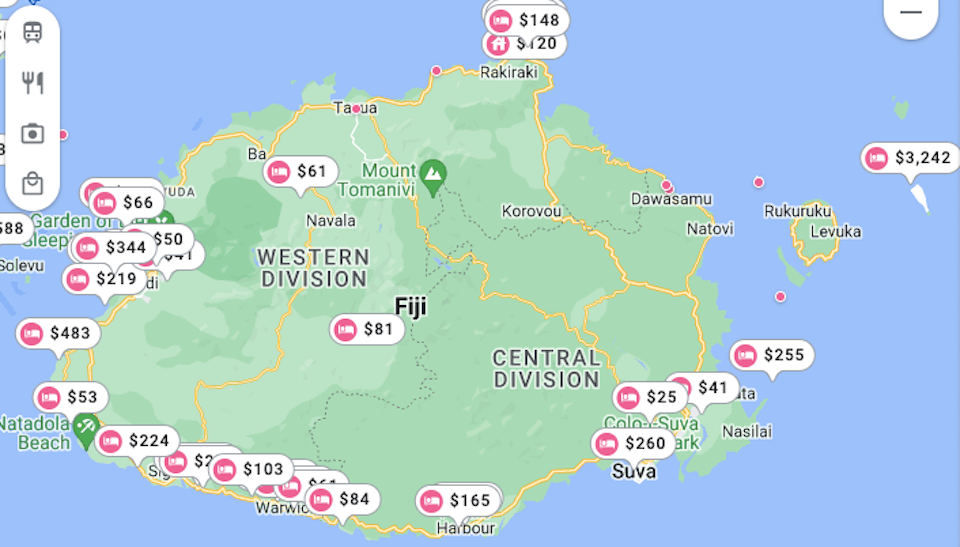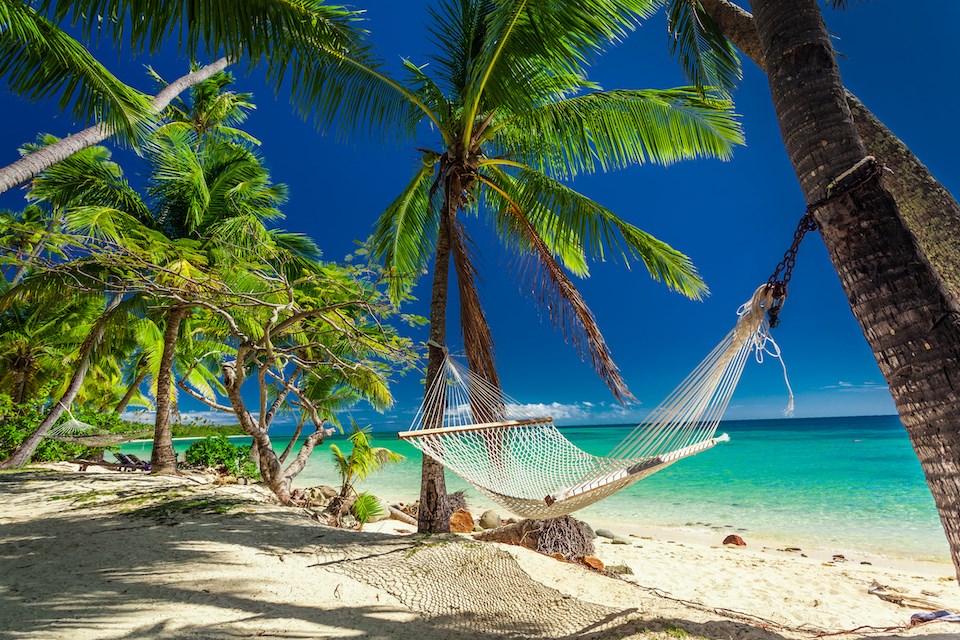Flights from Vancouver to Fiji offer one of the best deals for locals looking to experience the South Pacific on a budget.
Fiji Airways commenced non-stop flights between the country's largest airport, Nadi International Airport (NAN), and Vancouver International Airport (YVR) on Nov. 25, 2022.
The airline offers direct service between the two airports on Mondays and Fridays. Both flights are red-eyes, with the Vancouver one departing at 9:45 p.m. and arriving in Nadi at 5:30 a.m.; the return flight from Nadi departs at 10 p.m. and arrives in Vancouver at 10 a.m.
Nadi is a town on Fiji's largest island, Viti Levu. The capital and largest city, Suva, is also located on the big island. But with 333 remote tropical islands, visitors will discover plenty of crystal-clear waters, white sand beaches, plenty of sunshine, and an array of activities.
Here is everything you need to know to book a trip from Vancouver to Fiji.
What airlines should I fly to Fiji?
From Vancouver International Airport, travellers can fly to the following airports:
- Nadi International Airport on Viti Levu
- Suva-Nausori Airport (SUV) on Viti Levu
- Matei Airport (TVU) on Taveuni Island
- Savusavu Airport (SVU) on Vanua Levu island
- Labasa Airport (LBS) also on Vanua Levu island
Airlines that fly to or partially to Fiji via one of their airline partners include:
- Air Canada
- Air New Zealand
- Alaska Airlines
- American Airlines
- Cathay Pacific
- Fiji Airways
- JAL (Japan Airlines)
- Korean Airways
- Air Qantas
- United Airlines
- Virgin Australia
- WestJet
When should I book my ticket to Fiji?
Tickets to Fiji can cost a pretty penny if they are booked at the last minute. The least expensive flights from Vancouver to Nadi usually cost between $1,600 and $2,500 for return trips, according to Google Flights.
But flights booked a few months in advance can typically cost just over $1,000 including all taxes and fees. For instance, prices for tickets booked in late November for travel in February start at $1,100.
Flights departing the same month cost significantly more, with prices starting between $1,600 and $1,700 for return trips. Prices for tickets booked over six months in advance start to climb up again, too.
Looking for an even better deal? Sign up with Fiji Airways to receive notifications about sales or set a Google Alert to notify you about a price drop. Over the past year, the airline has slashed prices down to a jaw-dropping $739 for a return trip.
When is the best time of year to visit Fiji?
Travel that takes place between May through September offers the best chance to avoid rainy conditions and enjoy the tropical destination's coveted sunshine. April through October is considered the wet season.
Unfortunately, tropical cyclones can occur during the hot, dry months in the Southwest Pacific. While they are typically short-lived, some of them bring damaging winds and heavy rainfall.
Is it safe to visit Fiji?
The Government of Canada advises tourists to take normal security precautions in Fiji. This means that there aren't any glaring reasons why tourists should feel unsafe in the country.
That said, there are several factors to consider when you visit the islands. For example, petty crime, such as theft from hotel rooms and purse snatching, is common. Practice vigilance when you go out and put your valuables in your room safe.
Don't panic if a cyclone warning is issued. Since weather disturbances are tracked once they form in the Pacific, there is usually time to prepare ahead of the event. Tourism Fiji also has a list of things you can do for some extra peace of mind.
Since it is located in an active seismic zone, Fiji is prone to earthquakes. After strong ones, tsunamis may occur. Unlike cyclones, they are unpredictable and there may be little time to prepare if a tsunami warning is issued. If there is a massive earthquake, listen out for warnings on the local radio or websites.
Do I need a visa to visit Fiji?
You must have a valid Canadian passport to visit Fiji and it must be valid for at least six months beyond the date you expect to leave the country.
You must also have a ticket booked that shows when you will be flying out of Fiji. This doesn't require that you show when you plan to return to Vancouver but it must show when you plan to leave the country. In other words, it will suffice for you to have a ticket with a trip booked to another destination, such as Australia, after you leave.
Canada is on the list of countries that have visa exemptions for visiting Fiji. However, Canadian passport holders will be issued a tourist visa upon arrival for stays of up to four months.
What activities can you enjoy in Fiji?
Since it's an island destination, many of Fiji's most popular activities include swimming, snorkelling, surfing, sailing, scuba diving, stand-up paddle boarding, river rafting, and ocean kayaking. In fact, the county is also known as the "Soft Coral Capital of the World," which makes underwater exploration a diver's dream.
No diving certification? No problem — in select cases.
Travellers who visit the PADI 5-star dive resort can get a full scuba diving certification even if they have no previous experience. They can also snorkel with manta rays in the Yasawa Islands (between May and October).
Visitors will also find a wealth of fascinating places to explore on land. For one, Fiji has a rich history that dates back thousands of years, with "archaeological digs uncovering pottery shards dating back over 2,600 years," according to the Culture Trip.
Historophiles can explore the Naag Mandir Temple in Labasa on the island Vanua Levu. The Hindu temple is home to a sacred Cobra Rock that locals believe can cure the sick and infertile. Draped in garlands of flowers and other offerings, locals also say that the rock grows and "the roof has had to be raised four times since the 1950s," according to Lonely Planet.
Hiking is also popular in Fiji. Outdoor enthusiasts can tackle multi-day hikes across the big island's magnificent Suncoast with companies like Talanoa Treks. The big island is also home to the awe-inspiring Sigatoka Sand Dunes, which are located one of in the country's few national parks. These impressive national formations range from 20 to 60 metres tall and formed over thousands of years; the park is also a designated UNESCO World Heritage Site.
How much money will I spend on accommodation?
Prices for accommodation vary dramatically in Fiji — but your dollar can go a long way for a great value.
The three-star Likuri Island Resort, for example, is a secluded beach resort that features a pool, a full-service spa, a poolside bar, a private beach, and much more for as little as $53 per night.
On the other end of the spectrum, the tropical gem offers high-end experiences for travellers looking to experience posh accommodations and luxurious amenities.
The Wakaya Club and Spa, for example, only has 10 suites and two luxury villas on the private island accommodation. Situated near 2,200 acres of rainforest and surrounded by an ocean of magnificent coral, guests gaze out at truly awe-inspiring vistas from their thatched-roof bures.
The price tag for this ultra-exclusive stay?
Prices start around a whopping $3,242 a night.
There are also a host of accommodations with prices that range in between the cheapest and priciest options. On the big island, for instance, most places cost between $100 and $300 a night.




